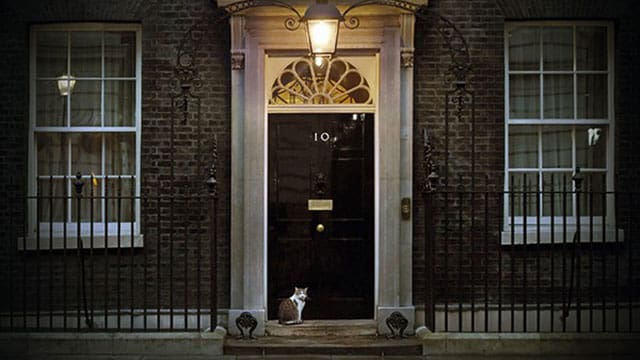Are the UK Tories heading for a 1993-style Canadian PC meltdown?
 At first glance, the answer seems obvious. Labour scored an overwhelming landslide, racking up 412 seats (out of 650) and reducing the Conservatives to a pitiful 121.
At first glance, the answer seems obvious. Labour scored an overwhelming landslide, racking up 412 seats (out of 650) and reducing the Conservatives to a pitiful 121.
Look closer, though, and the situation is more complicated.
Like ourselves, the UK uses a first-past-the-post voting system, which has the characteristic of producing significant disparities between vote share and seat share. Whether this is a feature or a bug depends on the extent to which you value stable government as opposed to the prospect of coalitions susceptible to excess influence from fringe parties.
This time, Labour hit the sweetest of sweet spots. With just 34 percent of the vote – the smallest vote share of any modern UK government – it scooped 63 percent of the seats. In contrast, Conservative Boris Johnson’s 44 percent in 2019 had produced a relatively modest 56 percent of the seats.
Thus, the Labour landslide was real in terms of parliamentary power but much less so in other respects. Rather than winning an enthusiastic endorsement, Labour benefited from a historically unprecedented efficiency in translating votes to seats.
Heading into the election, there was no material doubt about the fate of the Conservative government. After 14 years in office, they’d accumulated all the usual baggage of long-running governments, including their fair share of mishaps, mistakes, scandals and internal divisions. Electorally, they were toast waiting to be buttered.
But for Canadians with a political memory, there was an interesting question. Would the upstart Reform UK party do the same thing to the Conservatives as Preston Manning’s Reform did to the federal Progressive Conservatives in Canada’s 1993 election?
Just as happened in Canada back then, a substantial cleavage had developed between a goodly chunk of the UK Conservative base and the parliamentary leadership. Those disaffected felt unrepresented, ignored and taken for granted. The government they’d supported was no longer sufficiently conservative and either unwilling or unable to deliver on the things that most mattered to them.
And Reform UK leader Nigel Farage made his intentions explicit. It would be a two-step process. The Conservatives would be effectively destroyed in 2024, thus allowing Reform UK to supplant them as the centre-right alternative and subsequently bid for power in the following election.
So what actually transpired? How does it compare with Canada in 1993? And, more important, what might it portend?
In Canada, Reform outpolled the Progressive Conservatives (19 percent to 16 percent) and – thanks to a much more efficient vote distribution – scored 52 seats versus the Progressive Conservatives’ two. Measured by parliamentary presence, the insurgents suddenly held the whip hand.
What happened in the UK wasn’t quite so dramatic. While Reform did eat into the traditional Conservative support, their overall vote share (14 percent) was still markedly lower than that of the Conservatives (24 percent).
And Reform’s support was inefficiently distributed – 14 percent of the vote produced less than one percent of the seats. So, unlike the Progressive Conservatives in 1993 Canada, the UK Conservatives remain in the driver’s seat.
But they’re not out of the woods by a long stretch.
Compared to the previous election in 2019, the Conservatives lost 244 seats. And in more than 170 of those losses, the Reform vote was greater than the Conservative’s margin of defeat.
To quote BBC election guru Sir John Curtice: “Of course, not everybody who voted Reform would have otherwise voted Conservative, but they most certainly voted Conservative in 2019.”
Without winning the bulk of those voters back, it’s difficult to see an effective recovery path for the Conservatives. And this brings us to a critical difference between Canada 1993 and the UK 2024.
In Canada, the Progressive Conservatives evinced little interest or ability to grapple with what had happened to them. And they’d no surviving political figure with the inclination to address the issues that had caused so many hitherto loyal voters to abandon them.
That’s not necessarily the case in the UK.
For instance, there’s Kemi Badenoch. Born in England to Nigerian parents – Badenoch has described her background as that of a “middle-class Yoruba schoolgirl” – she’s a software engineer by training and first entered parliament as a Conservative MP in 2017.
Badenoch is also an unequivocal woman of the political right. Forthright and unapologetic in expressing her perspective and devoid of timidity, her ideological profile lends itself to a degree of sympathy with the concerns of Reform voters.
The UK Conservatives will soon be finding themselves a new leader. If it’s Badenoch, or someone like her, expect things to get interesting.
Troy Media columnist Pat Murphy casts a history buff’s eye at the goings-on in our world. Never cynical – well, perhaps a little bit.
For interview requests, click here.
The opinions expressed by our columnists and contributors are theirs alone and do not inherently or expressly reflect the views of our publication.
© Troy Media
Troy Media is an editorial content provider to media outlets and its own hosted community news outlets across Canada.

